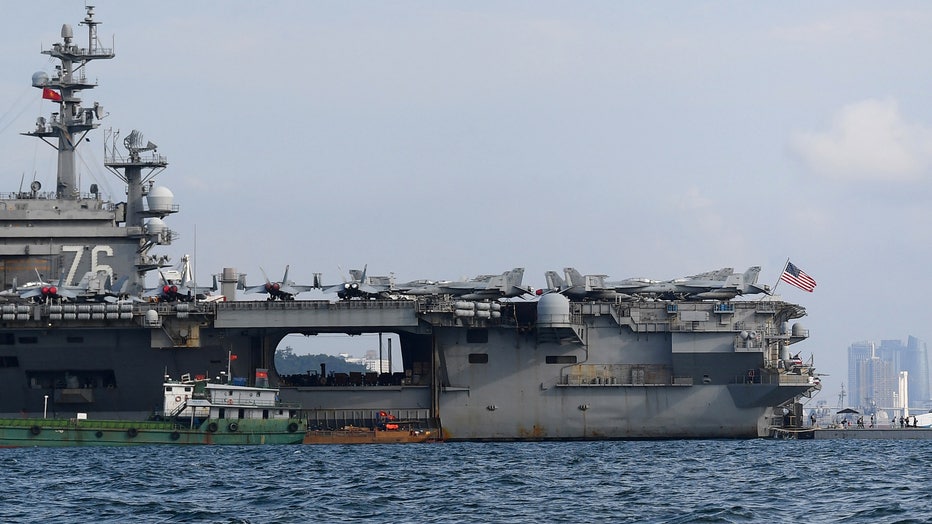North Korea threatens nuclear strike over US aircraft carrier's arrival in South Korea

North Korea expels U.S. soldier Travis King
Breaking this morning, North Korea says it will expel the U.S. soldier who crossed into the country through the heavily armed border between the Koreas in July. Officials there report that they have finished their questioning of Pvt. Travis King, but no official date of his expulsion has been given. King, who had served in South Korea, sprinted into North Korea while on a civilian tour of a border village on July 18, becoming the first American confirmed to be detained in the North in nearly five years.
North Korea lashed out Friday at the arrival of a U.S. aircraft carrier battle group in South Korea, calling it a provocation and again raising the specter of using nuclear weapons to defend itself.
Emboldened by its advancing nuclear arsenal, North Korea has increasingly issued threats to use such weapons preemptively. But the North is still outgunned by U.S. and South Korean forces, and experts say it is unlikely to use its nukes first, though it will continue to upgrade those arms without returning to diplomacy for the time being.
The North’s latest nuclear threat came a day after the USS Ronald Reagan and its battle group arrived at South Korea’s southeastern port of Busan, following U.S.-South Korean-Japanese naval exercise in international waters earlier this week.
South Korean defense officials said the carrier is to be docked at Busan for five days as part of an agreement to increase the temporary deployments of powerful U.S. military assets in response to the North’s growing nuclear program.
READ MORE: North Korea denounces US as 'persistent threat,' promises strong response
On Friday, the North’s official Korean Central News Agency called the aircraft carrier’s arrival "an undisguised military provocation" that proves a U.S. plan to attack North Korea is being realized. It threatened to respond in line with its escalatory nuclear doctrine that authorizes the preemptive use of nuclear weapons.
"The (North Korean) doctrine on the use of nuclear weapons already opened to public allows the execution of necessary action procedures in case a nuclear attack is launched against it or it is judged that the use of nuclear weapons against it is imminent," the KCNA dispatch said.

This photo taken on June 25, 2023 shows the USS Ronald Reagan, a US Navy Nimitz-class nuclear-powered aircraft carrier, docked at the port during a visit in Vietnam. (Photo by NHAC NGUYEN/AFP via Getty Images)
North Korea’s "most powerful and rapid first strike will be given to the ‘extended deterrence’ means, used by the U.S. to hallucinate its followers, and the bases of evil in the Korean peninsula and its vicinity," KCNA added.
North Korea has argued it was forced to develop nuclear weapons to cope with what it calls the U.S. and South Korean plots to invade. It has often responded furiously to the deployment of U.S. strategic assets such as aircraft carriers, long-range bombers and nuclear-powered submarines, as well as U.S. joint training exercises with South Korean forces.
Many experts say North Korea heightens tensions with its rivals to provide a pretext for expanding its nuclear arsenal and then uses the arms as leverage to wrest greater outside concessions.
Since last year, North Korea has conducted more than 100 missile tests in the name of responding to the expanded U.S.-South Korean military drills. Washington and Seoul say their drills are defensive in nature.
Last year, North Korea adopted a law that stipulates a broad range of situations in which it can use nuclear weapons, including when it determines that its leadership faces imminent attack by hostile forces or when it needs to prevent an unspecified catastrophic crisis to its people and government.
The U.S. and South Korean governments have repeatedly warned that any attempt by North Korea to use nuclear weapons would result in the end of the North's government led by Kim Jong Un.
On Friday, North Korea also accused the U.S. of being behind what it calls "a groundless and false rumor" that Hamas used North Korean weapons in its recent attack on Israel. Some media outlets including Radio Free Asia, a U.S. government-funded news service, earlier reported about Hamas’ suspected use of North Korean weapons such as F-7 high-explosive fragmentation rockets.
"What should not be overlooked is that the U.S. is resorting to its stereotyped smear campaign against (North Korea) to deliberately link the recent Middle East crisis to the latter," KCNA said in an article attributed to Ri Kwang Song, a commentator on international affairs of North Korea.
Ri said the U.S. administration's "reptile press bodies and quasi-experts" are spreading the rumors but didn't name them.

